

Juggling research projects and struggling to keep track of things? Don’t worry. With a spiffy new research management tool at the ready, you could be much more productive.
But what if you don’t have time to sift through dozens of tools and apps for research management to find the perfect fit? That’s where we come in!
We’ve narrowed it down to the top 10 research management software tools to use in 2024, so you can pick from the best of the best.
It’s time to level up! ?
What Should You Look for in Research Management Software?
Whether you’re an individual researcher or leading a research team, research management software tools make everything better. Here are some of the features we prioritized when picking the 10 tools on our list:
- Intuitive UI: Most tools will have a learning curve, but a configurable user interface makes it easier to get comfortable
- Compatibility: The best tools offer downloadable software, mobile apps, and web-based apps so your team members can work in Android, iOS, Mac, Windows, Linux, and their favorite web browsers
- Integrations: If you and your team use things like project management software, look for research management tools that’ll integrate with all of them
- Automations: Business process automation takes care of everyday tasks and lets you focus on the good stuff
- Templates: Look for something that’ll streamline your workflow with pre-made templates for things like resource management, project management, process mapping, and research planning
The 10 Best Research Management Software to Use
OK, let’s stop wasting time and get to the good stuff. Here are our picks for the 10 best research management software tools in 2024.
1. ClickUp
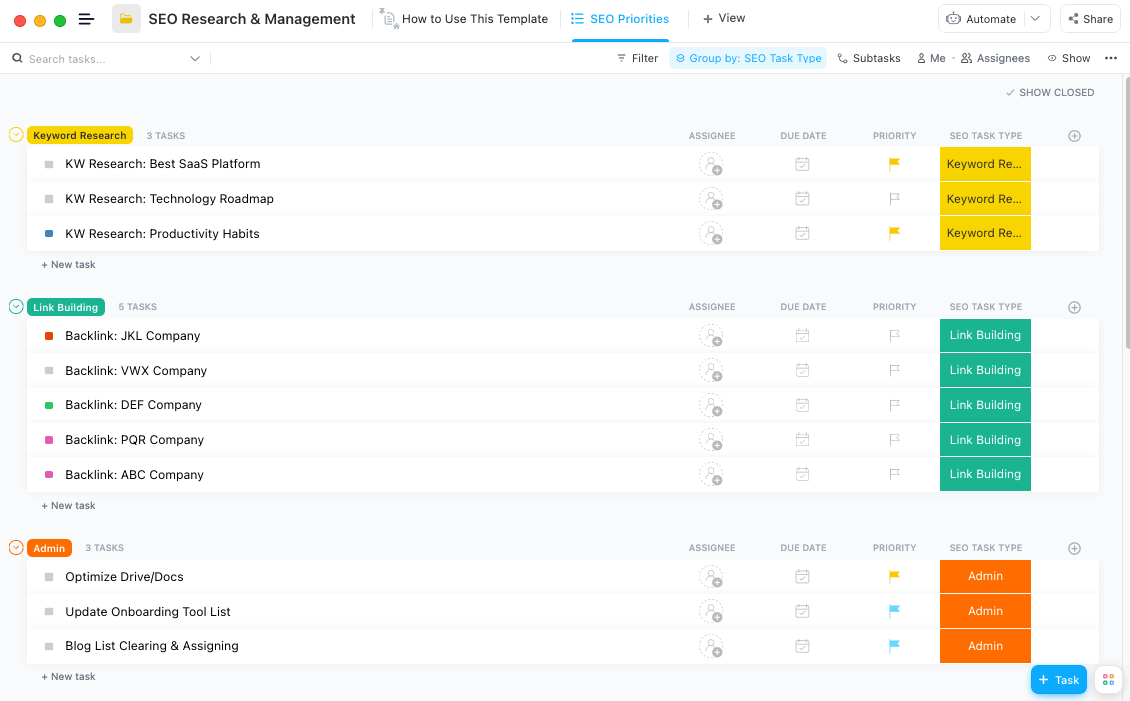
ClickUp is a cloud-based powerhouse with tons of research and project management software features for your research projects. It’s our top pick for a few reasons.
For one, we’ve spent countless hours refining it to be one of the most helpful tools around. It’s highly rated and at the top of several other lists, including G2’s Best Project Management Software Products & Tools in 2024.
ClickUp has real-time collaboration features, free Gantt charts, AI writing tools, project documentation tools, and so much more. It does almost anything you ask with customizable ClickUp Dashboards and dozens of handy templates, too.
For example, the ClickUp Research Project Plan Template breaks down complex tasks, organizes your resources, and communicates your progress using data visualization tools. And ClickUp Docs serve as a simple wiki software that lets you create beautiful Docs and wikis that are easy to connect to your workflows.
Did we mention that a lot of this stuff is available on the Free Forever plan? ?
ClickUp best features:
- Integration with 1,000+ other tools, including Google Docs, Google Scholar, Google Drive, Google Workspace, Microsoft Excel, Trello, Slack, Evernote, Dropbox, Chrome, GitHub, and Asana
- Customizable dashboards, notifications, spreadsheets, templates, time tracking, automations, and more
- ClickUp AI writing assistant summarizes metrics, compose emails, generate action items, draft metadata, and create social media posts in seconds
- Mobile app, web-based app, and desktop software works on all operating systems
- Task management features organize and automate your research process, whether you’re doing academic research for your thesis or managing your company’s research data
- Multiple views and tools allow you to organize large datasets with complex visualizations to manage references, research, and more
ClickUp limitations:
- Some new users report a learning curve (solved with simple, free tutorials)
- ClickUp AI isn’t available on the Free Forever plan (give it a spin with a free trial first)
ClickUp pricing:
- Free Forever
- Unlimited: $7/month per user paid annually
- Business: $12/month per user paid annually
- Enterprise: Contact for pricing
ClickUp ratings and reviews:
- G2: 4.7/5 (8,000+ reviews)
- Capterra: 4.7/5 (3,000+ reviews)
2. Tableau
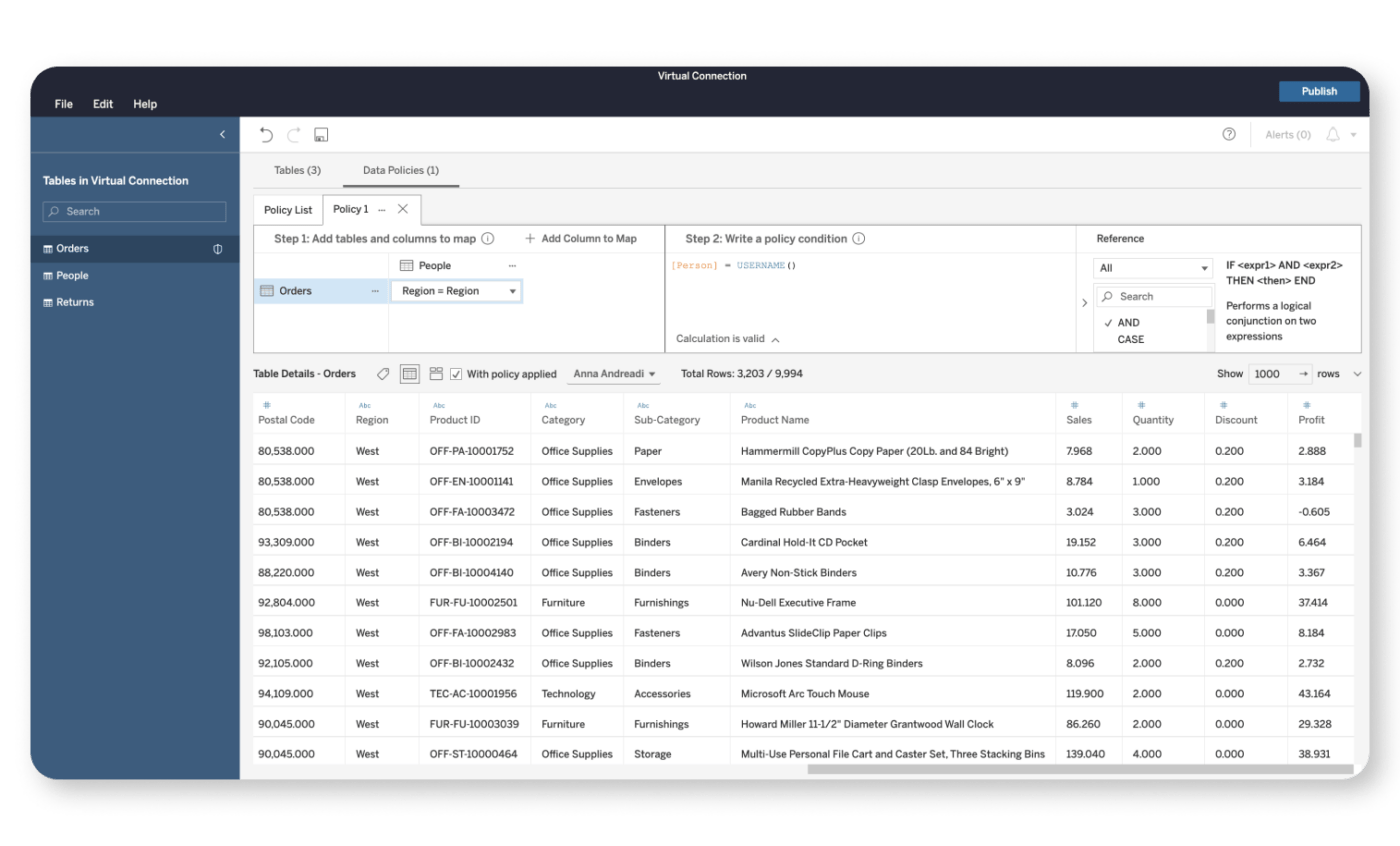
Tableau is a data visualization tool powered by Salesforce. It’s designed to connect data from different sources on a single analytics platform. The reference management software makes it easier to organize complex research data using a drag-and-drop interface and interactive dashboards.
Tableau makes your life easier with access to a range of data analysis and sharing options. And it’s designed for everyone from students and teachers to data scientists and business owners.
Tableau best features:
- Tableau Cloud provides a cloud-based analytics platform that drives better business outcomes and provides integrated data management
- Tableau Prep is a modern tool that makes it faster and easier to merge, edit, and organize your research data for efficient analysis
- Integration with a wide variety of products to make collaboration, data storytelling, and decision-making easier
- Training modules for onboarding your team minimize the learning curve with Tableau’s many research management tools
Tableau limitations:
- Users report that large files sometimes require long loading times and may result in crashing
- Some reviews mention bugs in new versions of Tableau software
Tableau pricing:
- Tableau Viewer: $15/month per user paid annually
- Tableau Explorer: $42/month per user paid annually
- Tableau Creator: $70/month per user paid annually
Tableau ratings and reviews:
- G2: 4.3/5 (1,000+ reviews)
- Capterra: 4.5/5 (2,000+ reviews)
3. GanttPRO
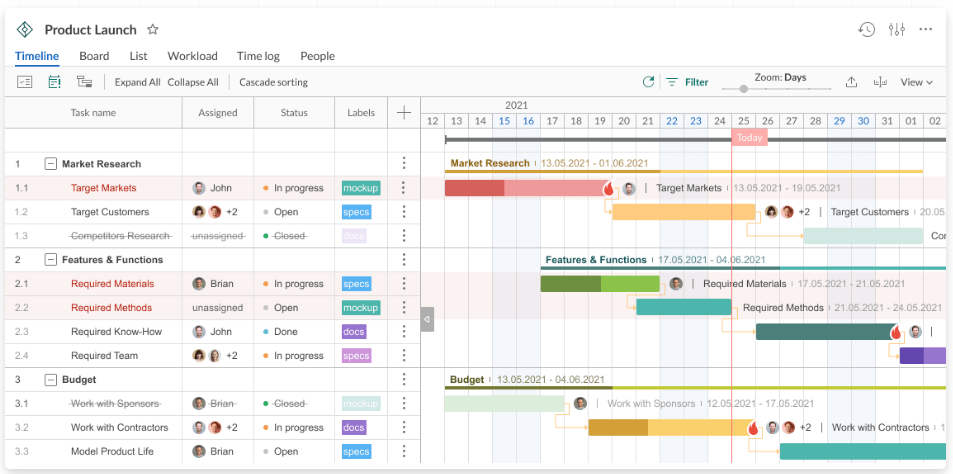
GanttPRO is a resource management system that uses Gantt charts for efficient project management. It’s also a research and reference management software that’s perfect for managing teams and organizing your workflow.
Import Excel spreadsheets and graphs or use pre-made templates to get your projects going pronto. Of all the research management tools in this list, GanttPRO helps you organize everything you need for thesis research, business data analysis, wiki pages, bibliographies, and more. ?️
GanttPRO best features:
- Multiple views allow you to create Kanban and scrum boards in addition to Gantt charts for better research and workspace visualization
- Integrations with Slack, OneDrive, Google Drive, and MS Teams collect all your work in one place
- Time logs let you track how much time you spend on each research task
- Collaboration tools make it easy for research teams to work together and communicate in real-time
GanttPRO limitations:
- Some views have limited customization options
- Reviews mention difficulty moving and converting tasks
GanttPRO pricing:
- Basic: $9.99/month per user
- Pro: $15.99/month per user
- Business: $24.99/month per user
- Enterprise: Contact for pricing
GanttPRO ratings and reviews:
- G2: 4.8/5 (400+ reviews)
- Capterra: 4.8/5 (400+ reviews)
4. Klipfolio
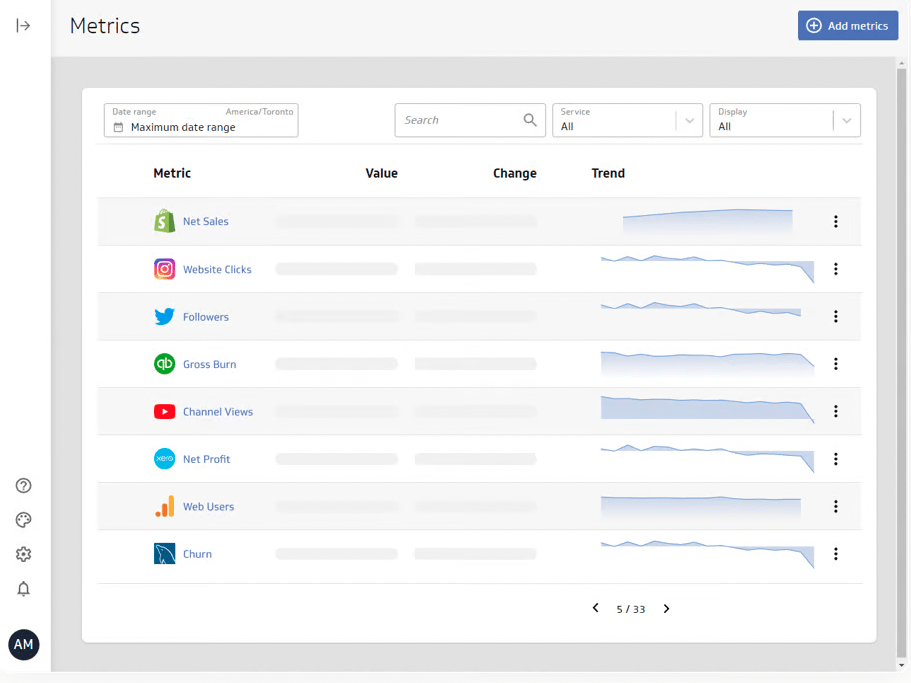
Klipfolio is a business dashboard tool that monitors your research data in real-time. It’s a metrics-focused platform that helps everyone make better decisions with access to the data they need when they need it. ✨
Individual users and data teams can use this powerful analytics tool to catalog data in a user-friendly platform that provides self-serve access to research information. Draft effective reports for team projects, organize citations for research papers and create useful dashboards for end-users.
Klipfolio best features:
- Integrations with 100+ other tools and apps, from Ahrefs to Zapier, with dozens of options in between
- Compatibility with Android and iOS mobile devices and most popular web browsers
- Klip Annotations allows you to create, update, and delete annotations quickly and easily
- User-friendly interface helps reduce the learning curve for new users
Klipfolio limitations:
- Some reviews mention a lack of alerts and notifications
- Some users report issues with needing to restart the application after adding elements to their dashboard
Klipfolio pricing:
- Go: $125/month
- Pro: $300/month
- Business: $800/month
Klipfolio ratings and reviews:
- G2: 4.5/5 (200+ reviews)
- Capterra: 4.7/5 (100+ reviews)
5. Whatagraph
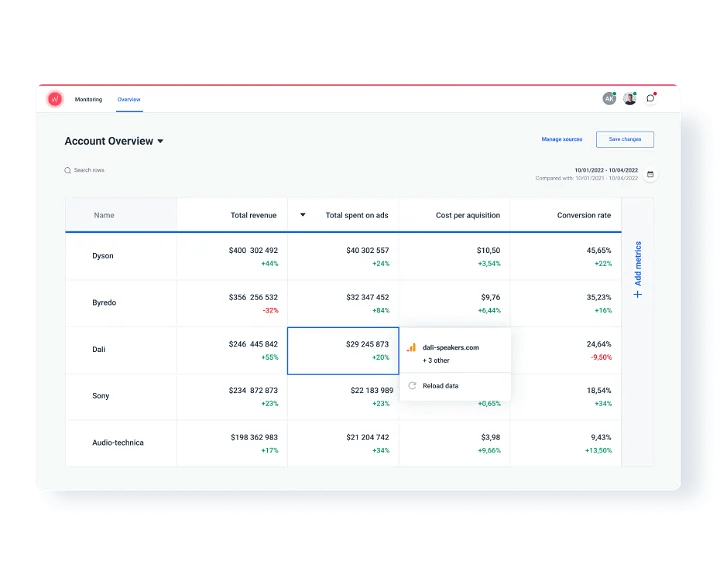
Whatagraph is a reporting tool that helps manage and visualize research data with customizable templates for efficient marketing projects. Move data, share reports with stakeholders, and build stunning reports. ?
Whatagraph replaces multiple tools and collects your team’s work in an easy-to-use data platform with a user-friendly dashboard. This tool is designed with in-house data research and marketing teams in mind.
Whatagraph best features:
- Integrations with 40+ tools and apps, including YouTube, Google BigQuery, LinkedIn, and BigCommerce
- Automates research data transfer to save your team members hours of work and streamline your workflow
- Generates quality reports in less time using data analytics software
- Analyze and manage web page performance data to give your marketing team the information they need to get results
Whatagraph limitations:
- Some reviews mention slow responses from customer service
- Some users report bugs that slow down their research process
- No real project management software features
Whatagraph pricing:
- Professional: $223/month paid annually
- Premium: $335/month paid annually
- Custom: Contact for pricing
Whatagraph ratings and reviews:
- G2: 4.5/5 (200+ reviews)
- Capterra: 4.4/5 (80+ reviews)
6. Looker
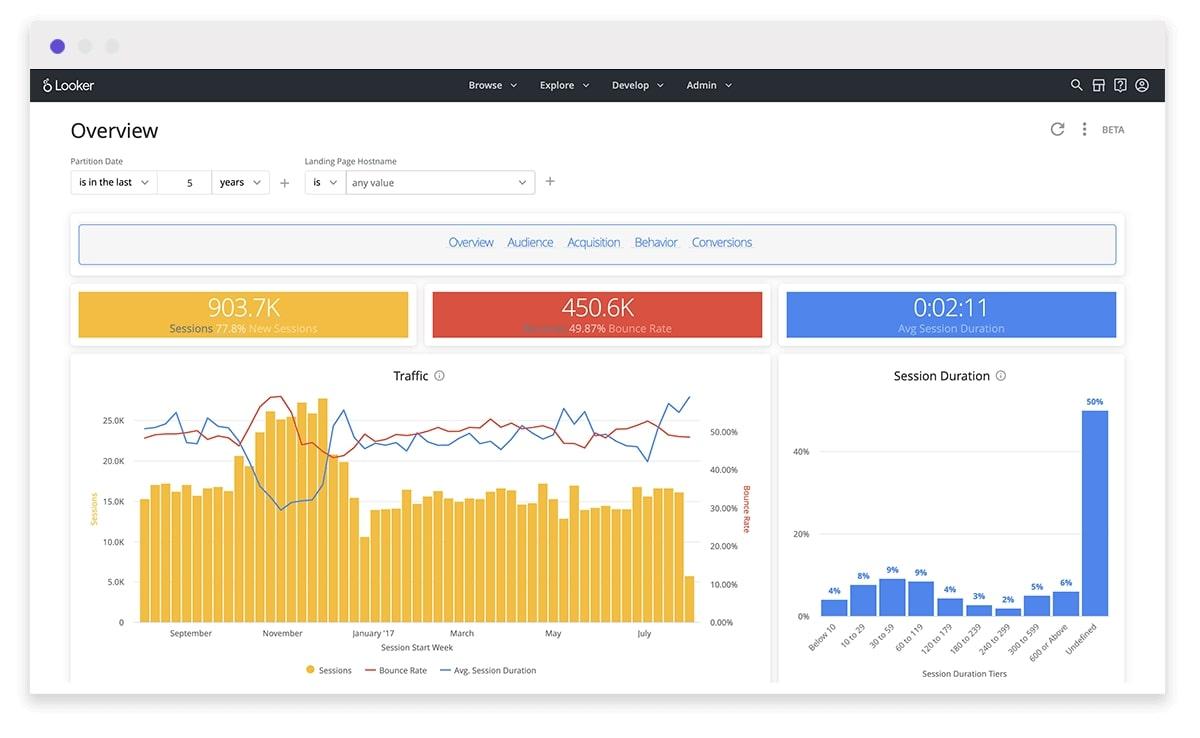
Looker (aka Google Looker Studio) is a browser-based data analytics platform that uses a unique modeling language to leverage, analyze, and visualize research data. Use it for governed and self-service business intelligence (BI), and to build the best apps for your organization’s metrics.
Collaborate in real time and capitalize on the fastest analytic databases available. Looker’s lightweight architecture allows developers to create flexible data and researcher apps quickly. ?
Looker best features:
- Intuitive user interface minimizes the learning curve for new users
- Integrations with multiple tools, including BigQuery Standard SQL and BigQuery Legacy SQL databases
- Customizable charts, tables, and reports allow you to share data insights with your team, classroom, or the world
- Report settings give database users and viewers the option to bookmark existing settings for future use
Looker limitations:
- Users report issues with the varied Google Cloud Pricing structure and the lack of a set monthly fee
- Some reviews report problems with the dynamic tables not displaying full text for headers
- Data focus means few project management software capabilities
Looker pricing:
- Google Cloud Pricing: Contact to request a quote
Looker ratings and reviews:
- G2: 4.4/5 (1,000+ reviews)
- Capterra: 4.5/5 (200+ reviews)
7. Bit.ai
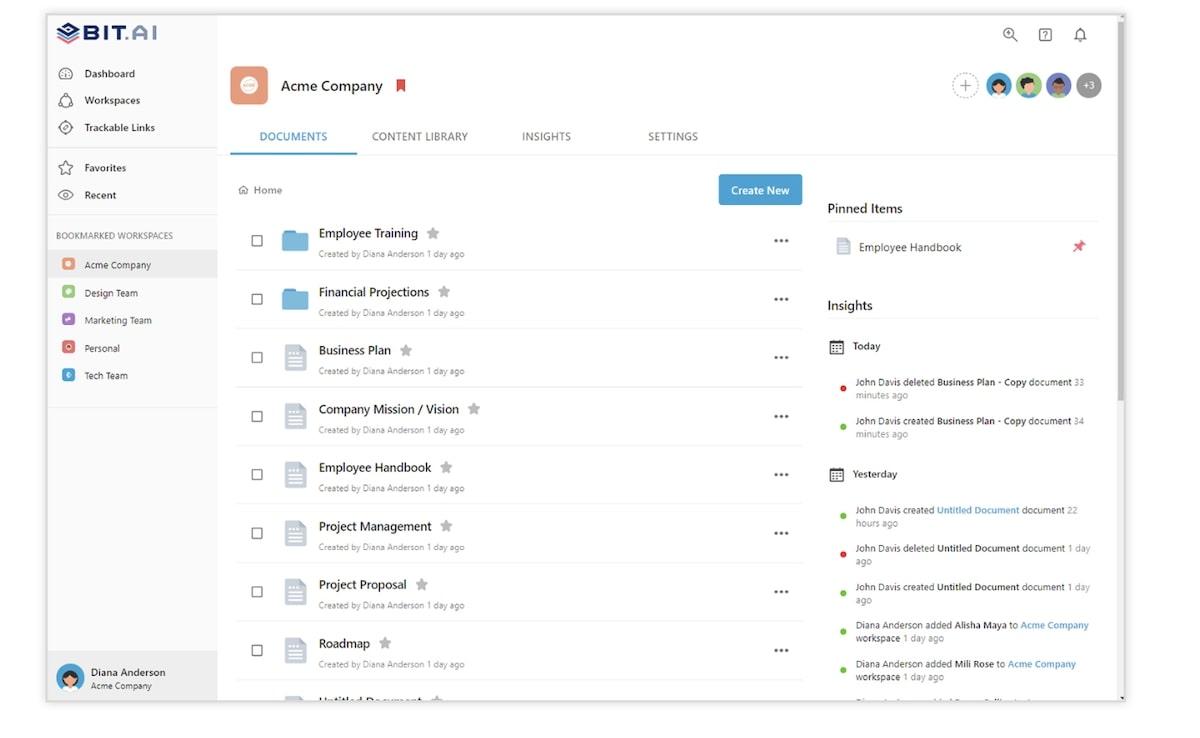
Bit.ai is a document collaboration platform designed for quick and easy note-taking, document creation, and research management. It builds dynamic knowledge bases, projects, and technical docs with various sharing and formatting options too.
Users have access to advanced design options, robust search features, powerful document tracking, and real-time collaboration tools. And teams can work together using this tool from around the globe across multiple platforms and devices.
Bit.ai best features:
- Collaboration tools allow you and your team to work together to create documents, wikis, notes, and web pages
- Integrations with dozens of other tools and platforms, including YouTube, Google Sheets, GitHub, Loom, and Typeform
- Intuitive collaboration and workflow design makes document creation simple for new users
- Automations allow you to complete research projects faster by taking care of small tasks
Bit.ai limitations:
- Some users mention issues with document creation
- Some reviews report trouble with the user interface and a need for a more user-friendly experience
Bit.ai pricing:
- Free
- Pro: $12/month per user
- Business: $20/month per user
Bit.ai ratings and reviews:
- G2: 4/5 (10+ reviews)
- Capterra: 5/5 (5+ reviews)
8. SciSpace (formerly Typeset.io)
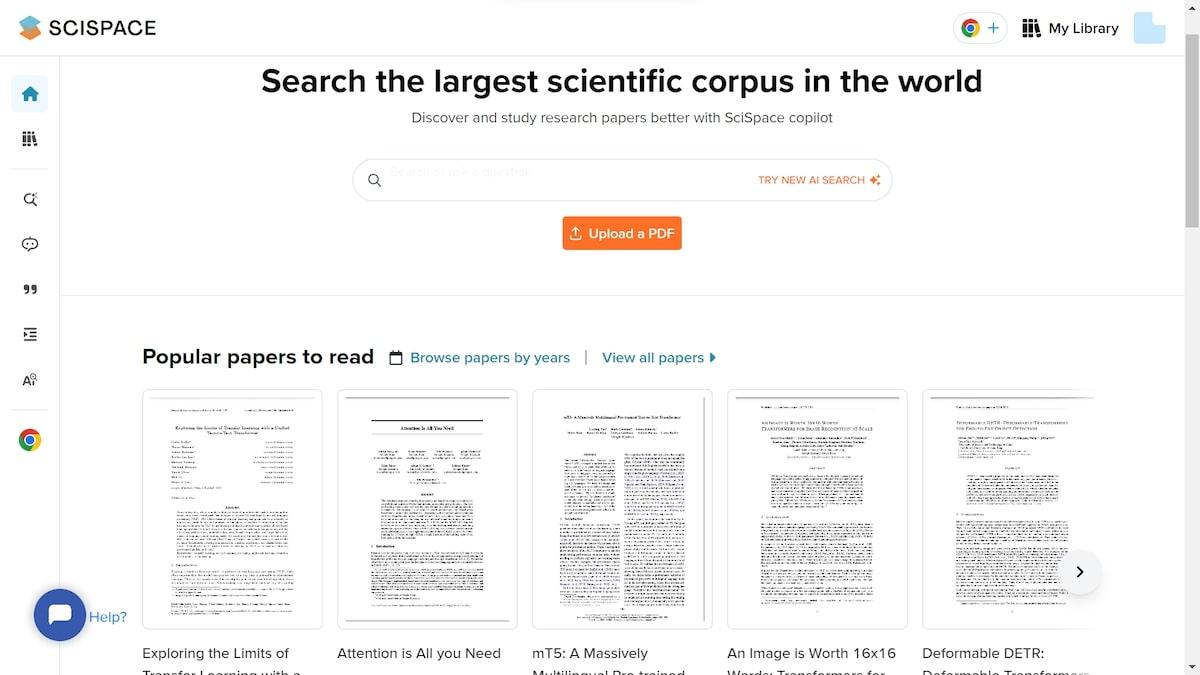
SciSpace, also known as Typeset.io, is a powerful researcher app designed to save you time using the power of AI. Discover and review a network of relevant papers and get simple answers from each one without spending hours deep-diving the content.
Minimize time spent on menial tasks and let SciSpace do the research for you while you find your answers. And you’ll have access to millions of papers and PDFs to get the info you need. It’s also easy to use in tandem with applications like Zotero and Mendeley.
SciSpace best features:
- Access to metadata of 200 million+ papers and 50 million+ Open Access full-text PDFs
- Workspace enables publishers, institutions, and researchers to collaborate and work efficiently on research projects
- Automations minimize time wasted with repetitive tasks so you discover information quickly
- Built-in plagiarism checker allows you to check your documents and identify issues that may be preventing you from getting published
SciSpace limitations:
- Some reviews mention issues with LaTeX templates
- Free plan does not include any major features
- Lack of reviews on major platforms
SciSpace pricing:
- Basic: Free
- Premium: $9.99/month
- Teams and Labs: $5.49/month per user
SciSpace ratings and reviews:
- G2: N/A
- Capterra: N/A
9. EndNote

Businesses use EndNote to build bibliographies and access research articles. This specialized reference and research management software lets you manage and format citations. It also protects your workflow with efficient data restoration functions. ?
Find, share, and use research within your EndNote libraries and work on your research from anywhere, on any device. The integrated document creation tools will make your writing more efficient.
Endnote best features:
- License requires a one-time fee instead of monthly payments
- Integrations with popular tools like Microsoft Word, Google Docs, and Open Office Writer
- Compatibility with desktop, iPad, and most popular web browsers
- Useful organization and research management tools let researchers drafting and citing their theses or writing in-depth research papers get their work done faster
Endnote limitations:
- Some reviews mention limited integration with word processing software outside of Microsoft and Google products
- You may need to correct occasional citation formatting errors manually
- Document system lacks task and project management software capabilities
Endnote pricing:
- Full License: $274.95 one-time fee
- Student License: $149.95 one-time fee
Endnote ratings and reviews:
- G2: 4.1/5 (100+ reviews)
- Capterra: 4.3/5 (30+ reviews)
10. Databox
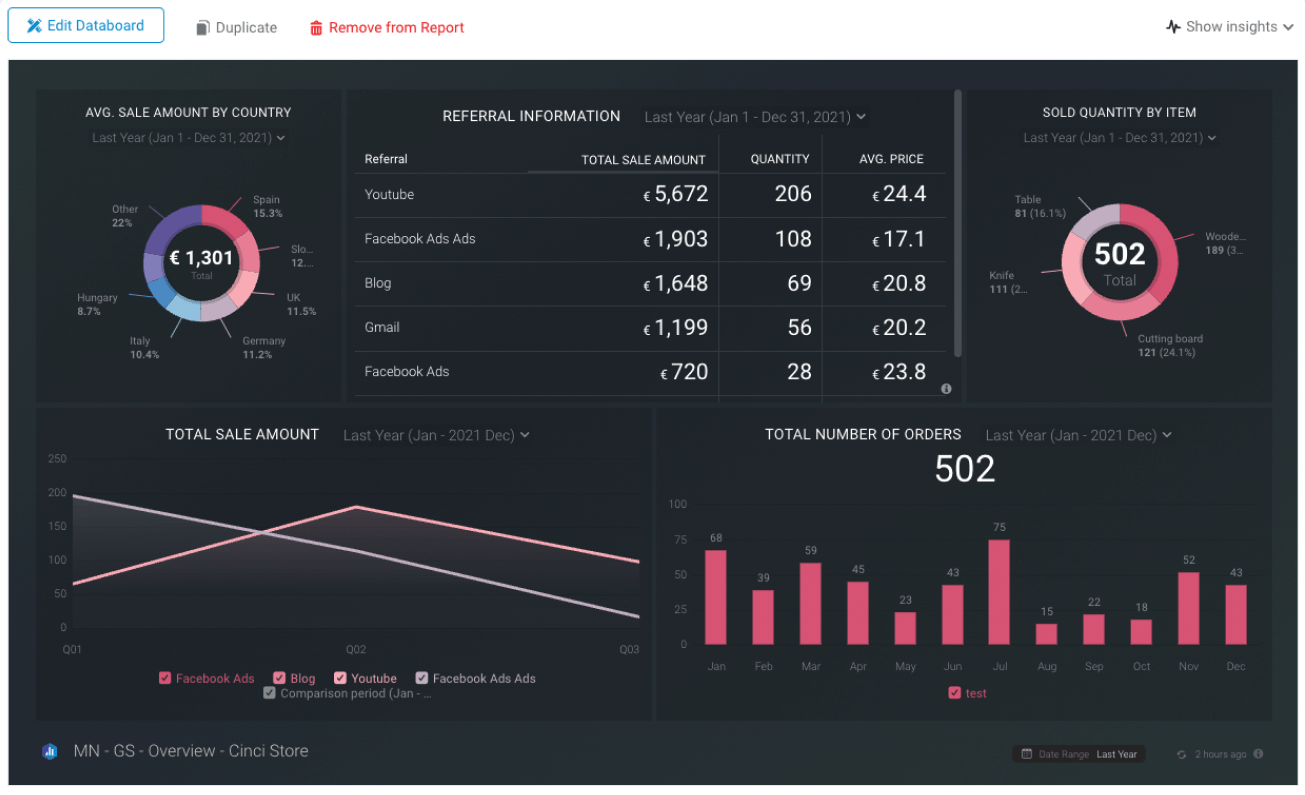
Databox is a business analytics tool that connects your data and tracks it from any device. Monitor your research data in real-time using a single dashboard to build and share reports, discover insights, and monitor trends. ?
Get daily, weekly, and monthly performance updates viewable through email and Slack and automated alerts for changes in important metrics. Everything is done without the need for coding or spreadsheets.
Databox best features:
- Integrations with 100+ popular tools, including HubSpot Marketing, Google Analytics, Facebook Ads, and Google Ads
- Setup is easy to manage for non-technical users and data research teams
- Data reporting makes it easy to progress toward your goals and share research data with clients
- Custom metrics and conversion rates are calculated quickly and easily
Databox limitations:
- Reviews indicate that individual users may find the business-oriented prices too high
- Users mention a lack of customization and visual tools
- Free version does not include access to most features and metrics
Databox pricing:
- Free
- Starter: $59/month
- Professional: $169/month
- Growth: $399/month
- Premium: $999/month
Databox ratings and reviews:
- G2: 4.7/5 (8,000+ reviews)
- Capterra: 4.7/5 (3,000+ reviews)
Unleash the Power of Your Research
With such a wide variety of research management software options listed above, you’re sure to find an option that does what you need at a price that fits your budget. So get ready to streamline your workflow, collaborate more effectively, and fall back in love with research. ?
If you want a tool that does it all at a price everyone can afford, try ClickUp. It’s free! You’ll have access to everything you need for research management, plus many other project management tools that’ll make your work and life more efficient.



